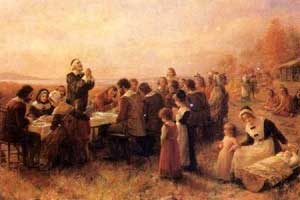 When the first emigrants from England began settling along the eastern seaboard of what would become America, they brought with them some of the banking practices they had enjoyed in their homeland.
When the first emigrants from England began settling along the eastern seaboard of what would become America, they brought with them some of the banking practices they had enjoyed in their homeland.
Making payments and conducting business with checks had become a firmly established part of European economics by the 18th century. From 1760 to 1800, the number of banks in London, for instance, doubled. Parliament finally gave permission for new corporate banks in the city in 1833, increasing the number of options available to residents, according to a history of check use, compiled by the Federal Reserve Bank of Atlanta.
When the American colonies began flexing their financial muscles, British political leaders began to impose difficult policies on the upstart new country, suppressing banks so that the colonists could use neither checks nor banknotes. The colonies were prohibited from issuing paper money, adding to the grievances that ultimately led to the Revolutionary War. But what followed the successful fight for independence was a hodge-podge of financial schemes developed independently by the individual colonies. The new country wrestled with the notions of central monetary control vs. the rights of the states to conduct their own economic affairs.
The U.S. Constitution was finally accepted by the colonies, denied the individual states the right to issue paper money, but gave them the ability to charter banks. Over the first few decades, the central government created some oversight authority by creating the First Bank of the United States, followed by the Second Bank of the United States. They failed to survive when early presidents saw them as symbols of British-style concentration of moneyed power.
The rapid expansion of the United States, with the frontier constantly moving farther west, created new challenges, particularly for those who wanted to conduct long-distance business. Newly established communities tended to be small and geographically isolated. Collecting on a check was difficult and costly. It was possible to negotiate a check, but no third parties were anxious to buy them because it was so tough to collect. “Documentary bills” became one method of expediting business from one area of the country to another. For instance, a cotton merchant in New Orleans could borrow money or make purchases in the southern city by drawing a documentary bill on his wholesaler in New York. A bill of lading would be attached to a shipment of goods to the north, indicating that the southern merchant had shipped cotton to New York of a value sufficient to cover the amount of the bill.
As some cities grew, their state–chartered banks created cooperative alliances with institutions in other cities, which facilitated the use of checks. Until the Civil War, however, checks functioned only as a local form of payment. Improvements in transportation and communication contributed to easing the difficulties and long-distance check payments gradually grew. Still, complications were rife. In one instance, a check drawn on a bank in Sag Harbor, New York, and received in Hoboken, N. J., changed hands ten times before its collection was finalized. The distance between the two communities was only about 100 miles. A remittance charge or exchange charge was often added to the costs of negotiating a check, to cover the cost incurred by the paying bank, which had to ship currency or coin or use some other means for settling the negotiation. One researcher referred to this era of check use in the United States as a “Haphazard arrangement riddled with inefficiencies.”
The National Banking Acts of 1863, 1864 and 1865 went a long way toward resolving the troublesome issues that surrounded use of checks. They allowed for federally chartered banks and took significant steps toward assuring that banks were fiscally sound by requiring that they hold reserves equal to the deposits they were receiving. The groundwork was laid for a national check clearing system and correspondent networks were created to simplify transfers of funds.
With more safeguards in place and fewer complications in successfully negotiating a check, the United States moved by degrees to its current situation in which check use is not for business only, but for the vast majority of individuals, who write checks with never a thought to how it all came about.